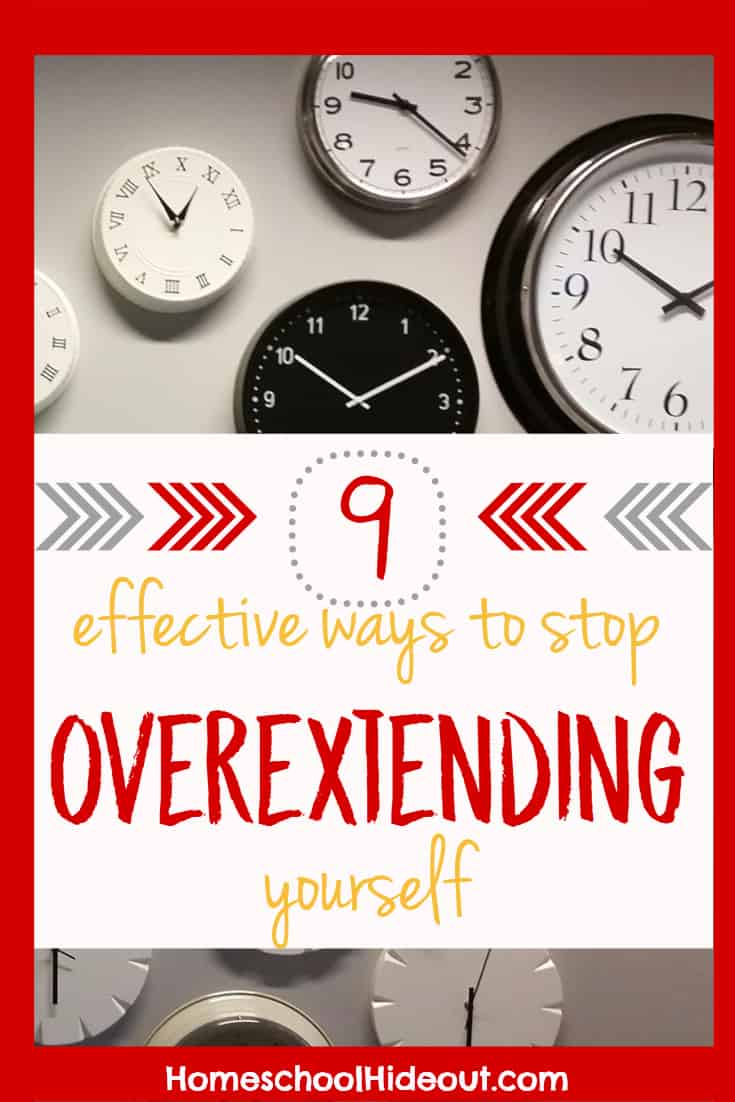There are times when we find ourselves taking on more than we can handle, whether it’s projects at work, chores at home, activities with the family, or arrangements with other people. Soon, we experience the signs and effects of spreading ourselves thin: sleep deprived, eating on the go, getting anxious about time, and generally feeling frazzled.
If this sounds familiar to you, pause for a moment. Consider what acclaimed playwright Raymond Hull once said: “He who trims himself to suit everyone will soon whittle himself away.”
Before any whittling away happens, take a step back and try these nine effective ways to stop overextending yourself.

Acknowledge The Problem
There’s a normal level of busy, then there’s a frantic, more-than-you-can-chew busy. When you start to feel like you’ve reached that latter point, don’t allow it to stay that way. An unhealthily hectic lifestyle is not something you should get used to, even if you believe you have to keep carrying so many responsibilities. Acknowledge that there is too much on your plate and that you need to make adjustments now.
Identify What Can Wait
The first step to adjusting your lifestyle is prioritizing, and this means setting aside the things that are not urgent. We sometimes see things as crucial even when they are not: extra-curricular activities, social calls, even the mere expectations of other people. When you examine your to-do list, you’ll likely find that many of the items there can wait.
Lifestyle author Rebecca A. Watson offers this three-step advice:
- Identify three things on your list that are important and have to be done the soonest.
- Identify three things that are important but can be done after the previous three.
- Look at the rest of your list; confirm that they are not as crucial and can wait.
Be Ruthless About Priorities
Once you’ve identified your priorities, be firm and uncompromising about them. Nothing should get in the way of your top three priorities, and you will want to make decisions around these most vital things. A key element here is your own self-resolution to stick to your prioritized list.
Just Say No
Part of being firm is knowing when and how to say no. You may have experienced agreeing to new tasks or saying yes to invitations just because you felt socially obliged – even though in truth, you did not really feel comfortable about accepting another obligation. For situations like these, there are polite and tactful ways to refuse. For example, you can say “I need to check my calendar; can I get back to you?” or “I’m not really interested, but thanks for asking.”
One more thing about saying no is that you may need to deliberately practice it. For many of us, saying yes has become so automatic that we forget to consider everything else first. Practice the habit of waiting before committing: whenever you get a request or invitation, pause before giving an answer.
Set Time For Yourself
Me-time is not a luxury but a necessity. If you neglect your mental and emotional wellness, it will eventually have an impact on your responsibilities. So don’t just put off rest, relaxation, and recreation for when you ‘find’ the time – make the time for these. Include me-time as a real item in your schedule.
The ideal activities for me-time are those that let your mind rest while revitalizing you. Try a brisk walk, a workout, or a period of doing only your favorite hobby.
 Sleep Right
Sleep Right
Notice how rejuvenated you feel after a good night’s sleep? And notice how, when you are sleep-deprived, it’s difficult to focus and accomplish anything? This is your body telling you that proper sleep is essential. Unfortunately, busy people tend to sacrifice hours of sleep each day, thinking they can do more even when they are tired.
If you find yourself doing this, you can still break the pattern. Start by committing to bedtime: set a specific time to go to bed (preferably before midnight) and be firm about stopping all your activities by then. Then, spend a few minutes to let your mind and body wind down. Read a book, listen to a podcast, or do absolutely nothing. During this time, stay away from electronics such as cellphones and TV, as these have been shown to affect the quality of sleep.
Sit Down For Your Meals
Your physical health is a foundation for everything you do, yet it’s usually the first to suffer when things are hectic. If you just keep on picking up a quick sandwich to eat on the go – or skipping meals altogether – you could run low on good fuel for your body.
Make it a point to nourish yourself well every day. This means actually minding the food you eat and letting your body process it correctly. As a bonus, sitting down for meals with the people you love gives you a chance to catch up and share good conversations with them.
Ask For Help
This advice sounds like common sense, but in reality, we often forget to ask for help even when we truly need it. Consider this your gentle reminder: there are people who can help you take care of the kids, complete a project, or just do regular chores – and it’s okay to ask. Sharing the workload not only reduces the stress and frustration around you, it also gives you a chance to bond with the people you’re working with.
Surround Yourself With Positivity
Busy times call for lots of energy boosts and inspiration. As much as possible, be in the company of people and things that invigorate you: your family and good friends, your mentors, your passions, or even just cute puppy videos that make you laugh. Likewise, avoid unnecessary stressors – minimize mingling with overbearing coworkers or gossipy neighbors!
The bottom line is focusing your energy on what’s essential and positive. Life may be a little more eventful for you, but with an inspired spirit that knows how to pick its battles, you can ace it.

About the Author
Ashley Drake is an attorney at Goldman Law out of Denver, Colorado with experience in family law matters. Ashley has also volunteered as a Court Appointed Special Advocate to protect the best interests of abused and neglected children in her community. When not lawyering or spending time with her family Ashley enjoys reading, skiing and teaching Yoga.


 Sleep Right
Sleep Right





